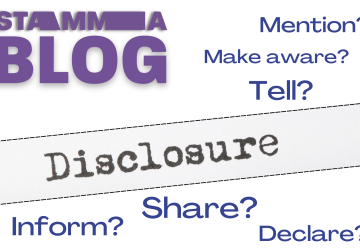
Blog: The trouble with 'disclosure'
6th February 2023
Talking about stammering is good. But is 'disclosing' a stammer the right term to use?
At STAMMA's Employment Support Service, we spend lots of time thinking about how employers and organisations can create more comfortable working environments for their staff who stammer. A starting point for many is understanding that some of their staff stammer. But employers are not always very good at encouraging employees to tell them about it.
The term 'disclosing' is used a lot in this context. But do we really want to disclose that we stammer?
Let's be clear we're focusing on the word 'disclose' here. This isn't a discussion on being open about stammering. A lot of research has been done on the benefits of telling other people that you stammer. Telling others can help make you feel more comfortable, knowing that the listener is aware you stammer. Dr. Courtney Byrd, Professor of Communication Sciences & Disorders at the University of Texas, found that the act of 'self-disclosing' a stammer can have a positive effect on the way the listener views you1, as she mentions in this brief YouTube clip.
The term disclosure is used all over the place. It's especially obvious around the world of work, where we're asked to 'disclose' information at application and interview stages, then for employee data collection, etc. The word makes numerous appearances across STAMMA's website, too, for example our page on Job-hunting & Interviews, and Natasha's Your Voice piece 'Disclosing my disability at work'.
Problematic?
But the more we think about that term 'disclose', or its sibling 'disclosure', the more we wonder if the word carries a lot of baggage. Especially following our 2020 campaign Find the Right Words, where we challenged the negative descriptions usually used around stammering.
Does 'disclosing' something sound like a shameful admission?
According to dictionaries, 'disclose' means to reveal something that's hidden. Is that a great fit with stammering? Perhaps it applies superficially if we stammer covertly. Though when our stammering is obvious, telling someone about it isn't exactly revealing a secret.
Some might argue that disclosure is a neutral word meaning simply to reveal information that wasn't previously known. But it might also have less positive connotations — like when a politician might be pressured into disclosing fines for tax avoidance, or forced into disclosing former scandals while running for office.
Does 'disclosing' something sound like a shameful admission? There's certainly a sense that it is telling others about something big and important. It's also quite a formal, legalistic word.
What's the alternative?
So, we've been considering and compiling some alternatives. For example:
| Disclose and alternative phrases | What impression does it give? |
| Disclose | Formal. Telling a big, or even shameful, secret |
| Tell | Factual, low-key, straightforward |
| Make aware | Ditto, but wordier |
| Share | Has a sense of empathy |
| Inform | Formal — a bit less formal than 'disclose' |
| Self-advertise | It's our choice |
| Mention | Casual, in passing |
| Declare | Public announcement, formal |
| Put on record | Formal |
| Let you know | Informal |
There's no single best choice.
If we, as people who stammer, are instigating the conversation, it will depend on the circumstances and what we're trying to convey to the listener. It will also depend on how comfortable we feel talking about stammering, how obvious our stammer might be, and on our mood on the day. It's our choice. We might decide 'disclosure' best fits the occasion. But it's good to have in mind alternatives if it doesn't feel right.
And if an employer, university, or any other organisation is making a request, we'd urge them to consider if there's more appropriate language they can use before asking in a knee-jerk way for 'disclosure' of personal information. It might make a big difference to putting people at ease.
Going forward, here at STAMMA we're going to think twice before using the word 'disclose' on the website. Our gut reaction is we'll typically opt for 'tell' — it's brief and to the point. After all, it's only about letting someone know we stammer. No big deal.
What do you think? We'd love to hear your opinion. If you want to write a Your Voice article on the topic, even better. Email us at editor@stamma.org
1 Byrd C, et al, (2017), The Effects of Self-Disclosure on Male and Female Perceptions of Individual Who Stutter, pubmed.gov

































